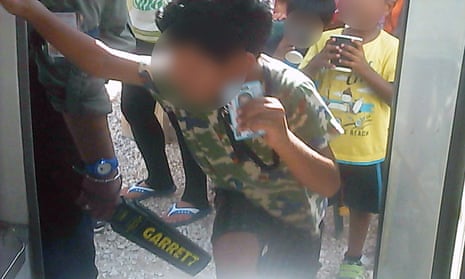All asylum seeker children should be removed from the Nauru detention centre because the centre is “insupportable” in its current form, a Senate inquiry has found.
The Nauru regional processing centre is marred by widespread allegations of child abuse, violence against asylum seekers, deprivation and sexual assault, and the Australian government does not know what is happening on the island, a five-member cross-party select committee into abuse on the island reported on Monday.
“Nauru is not run well, nor are Wilson Security and Transfield Services properly accountable to the commonwealth despite the significant investment in their services,” the majority report says.
“The committee believes that the shortcomings of the current framework offer no reassurance that the department is fully aware of events on Nauru.”
All asylum seeker children should be removed from Nauru, new laws should mandate reporting of sexual assault and violence allegations, and workers on the island should submit to daily drug and alcohol tests, the committee’s report recommended.
Women and children – there are now 87 in detention – were particularly vulnerable to sexual harassment and assault, because they could not be removed from the island, or moved anywhere safe on Nauru, the committee argued.
The committee also found that Australia – not Nauru – is legally responsible for the abuses in Nauru detention centre, because it has “effective control” of it.
Australia’s justifications that problems on Nauru are a matter for that country’s government are “a cynical and unjustifiable attempt to avoid accountability”, the committee said.
“Australia created the regional processing centre in Nauru. It is Australia’s responsibility and in its present form, it is insupportable.”
The committee condemned the Department of Immigration and Border Protection for its lack of control of the centre, and the absence of any reporting mechanism for staff “to disclose allegations of mistreatment, abuse or to make complaints”.
“The department has been unaware of serious acts of misconduct by staff of contractors, as those contractors have not adequately fulfilled their reporting obligations.”
The committee said the government and its contractors had attempted to hide information about what was happening on Nauru. “The committee remains of the view that the government in particular has sought to avoid the full accountability to which the Senate is entitled.”
The report found that running the detention centre on Nauru has cost Australian taxpayers $1.333bn since it was reopened in September 2012 – about $37m a month.
On average, asylum seekers spent 402 days in detention on Nauru.
The Senate inquiry follows last year’s report by the Australian Human Rights Commission, The Forgotten Children, into children in Australian immigration detention.
That report found that more than 300 children committed or threatened self-harm in a 15-month period in Australian immigration detention, 30 reported sexual assault, nearly 30 went on hunger strike, and more than 200 were victims of assaults.
The government will respond to the Senate report after consideration of its recommendations. The office of the immigration minister, Peter Dutton, has been contacted for comment.
The Liberal party senators on the committee, Linda Reynolds and David Johnston (who replaced Cory Bernardi), presented a dissenting report, arguing that the government of Nauru was responsible for the running of the centre and that much of the inquiry was politically motivated.
“The government has a determined and successful policy of ending the illegal trafficking of people into Australia and this policy is politically unacceptable to some senators,” they wrote. “This inquiry has sought in many respects to advance the political perspective of those opposing senators.”
The government senators said many of the allegations of abuse were untested and reliant on “unsubstantiated hearsay”. They said the number of children in detention on Nauru had decreased significantly under the government and said all of the committee’s recommendations were “redundant”.
The Greens’ immigration spokeswoman, Senator Sarah Hanson-Young, who was spied upon by guards when she visited Nauru on an official visit, said the detention regime was damaging children. “It can’t be made any clearer that locking children up with the guards on Nauru is exposing them to abuse,” she said.
“The government’s head-in-the-sand approach to mounting evidence of systemic child abuse is causing immeasurable harm.”
The Greens tabled additional recommendations including: the reinstatement and compensation of 10 Save the Children workers who were sacked on untrue allegations of coaching self-harm among asylum seekers; a royal commission into children in detention, and; an Australian federal police investigation into spying allegations.
Hanson-Young also called for the termination of Transfield’s contract to run the Nauru detention centre on the day the government indicated it wanted to negotiate with Transfield for another five-year deal.
When questioned about the inquiry’s recommendation that journalists should be allowed to visit the Nauru detention centre, Dutton, the immigration minister, said he would not dictate migration matters to another sovereign country.
“It’s an issue for the Nauruan government,” he told Sky News.

Comments (…)
Sign in or create your Guardian account to join the discussion